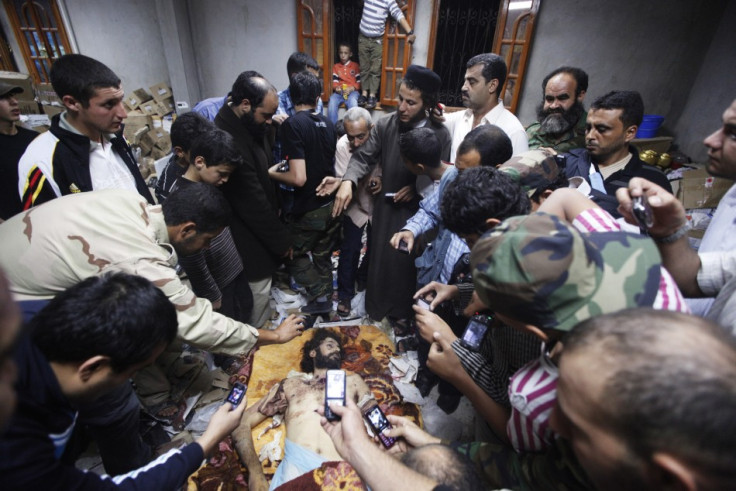Libya at a Crossroad between Peace and Violence after Gaddafi’s Death

Libyan authorities and Western leaders hailed Muammar Gaddafi's death as a victory, saying it is now time to focus on reconstruction efforts, but despite scenes of jubilation inside and outside Libya, the future of the country is still very uncertain.
Months of civil war have left the country deeply fractured, so the handling of the aftermath of the leader's death is set to be decisive.
"Finally the way is free for a political rebirth for peace," German Chancellor Angela Merkel said, adding she was "relieved and very happy" at the news.
For French President Nicolas Sarkozy, the colonel's death represents an opportunity for the Libyan people to "to free themselves from the dictatorial and violent regime that was imposed on them for more than 40 years".
U.N. Secretary-General Ban Ki-moon also said that "this is only the end of the beginning. ... The road ahead for Libya and its people will be difficult and full of challenges. This a time for healing and rebuilding, for generosity of spirit, not for revenge."
With conflicting details about Gaddafi's death emerging, many wonder if attacks against the former leader's supporters will now stop - or whether a wave of vengeance will grip the country.
For many, the handling of former Gaddafi loyalists and of his tribesmen, the Qadhadfa, will be crucial in leading Libyans toward peaceful coexistence.
The sentiment was echoed by London-based rights group Amnesty International, which said it was essential to conduct "a full, independent and impartial inquiry to establish the circumstances of Col. Gaddafi's death".
While Libya has finally gotten rid of its dictator, it will be difficult for a country left without a parliament or any democratic traditions to transform into a full-fledged democracy.
Years of repression have left the civil society underdeveloped, while political parties were banned and sectarian divides actively encouraged by the former regime.
Men who have fought alongside the National Transitional Council to free their country now also expect some form of compensation and fighters have already announced they expect leaders from their own clan to be included in the new Libyan political map.
Despite officially controlling a majority of the territory, it is not clear yet how much the NTC forces are actually in control.
Many of the Libyan fighters were also volunteers who fought for their country but were not soldiers by profession, so rebuilding a strong but loyal army will also prove challenging for the new government.
Throughout the conflict, the country has also been flooded with arms, so security remains a priority.
Reports from the ground suggest that some of the fighters have already announced they will not relinquish their weapons until assured their tribe and rights will be represented in the new Libya.
Even in the capital Tripoli, civilians have acquired guns, to protect themselves as for months insecurity was rife.
The African continent is already affected by the proliferation of light weapons, and militias are continually looking for new armament, so with guns easily sold on the black market, nothing ensures civilians or fighters would be willing to trade them to the authorities freely.
Years of patrimonialism and clientelism have also left the country's political and judicial institutions ridden with corruption so cleaning up Gaddafi's mess is set to take years rather than months.
In addition, after years of dictatorship, Libyans will now have to redefine the identity of the state and agree on a common and coherent vision of the future. With Western aspirations set to clash with more traditionalist or religious views, Libya is a country where structural divides seem embedded, so it remains to be seen whether Gaddafi's death will symbolise the beginning of the peace or of more sombre months to come. For now Libya clearly is at a crossroad.
© Copyright IBTimes 2025. All rights reserved.





















